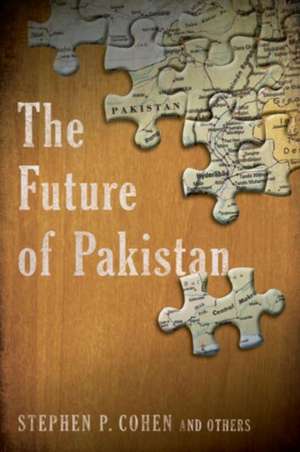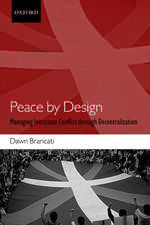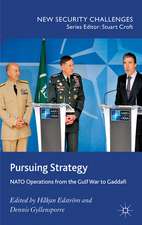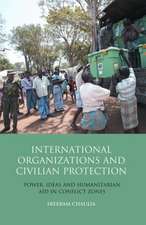The Future of Pakistan
Autor Stephen P. Cohenen Limba Engleză Paperback – 4 noi 2011
With each passing day, Pakistan becomes an even more crucial player in world affairs. Home of the world's second-largest Muslim population, epicenter of the global jihad, location of perhaps the planet's most dangerous borderlands, and armed with nuclear weapons, this South Asian nation will go a long way toward determining what the world looks like ten years from now. The Future of Pakistan presents and evaluates several scenarios for how the country will develop, evolve, and act in the near future, as well as the geopolitical implications of each.
Led by renowned South Asia expert Stephen P. Cohen, a team of authoritative contributors looks at several pieces of the Pakistan puzzle. The book begins with Cohen's broad yet detailed overview of Pakistan, placing it within the context of current-day geopolitics and international economics. Cohen's piece is then followed by a number of shorter, more tightly focused essays addressing more specific issues of concern.
Cohen's fellow contributors hail from America, Europe, India, and Pakistan itself, giving the book a uniquely international and comparative perspective. They address critical factors such as the role and impact of radical groups and militants, developments in specific key regions such as Punjab and the rugged frontier with Afghanistan, and the influence of—and interactions with—India, Pakistan's archrival since birth. The book also breaks down relations with other international powers such as China and the United States. The all-important military and internal security apparatus come under scrutiny, as do rapidly morphing social and gender issues. Political and party developments are examined along with the often amorphous division of power between Islamabad and the nation's regions and local powers.
Uncertainty about Pakistan's trajectory persists. The Future of Pakistan helps us understand the current circumstances, the relevant actors and their motivation, the critical issues at hand, the different outcomes they might produce, and what it all means for Pakistanis, Indians, the United States, and the entire world.
Praise for the work of Stephen P. Cohen
The Idea of Pakistan: "The intellectual power and rare insight with which Cohen breaks through the complexity of the subject rivals that of classics that have explained other societies posting a comparable challenge to understanding."— Middle East Journal
India: Emerging Power: "In light of the events of September 11, 2001, Cohen's perceptive, insightful, and balanced account of emergent India will be essential reading for U.S. foreign policymakers, scholars, and informed citizens."— Choice
Led by renowned South Asia expert Stephen P. Cohen, a team of authoritative contributors looks at several pieces of the Pakistan puzzle. The book begins with Cohen's broad yet detailed overview of Pakistan, placing it within the context of current-day geopolitics and international economics. Cohen's piece is then followed by a number of shorter, more tightly focused essays addressing more specific issues of concern.
Cohen's fellow contributors hail from America, Europe, India, and Pakistan itself, giving the book a uniquely international and comparative perspective. They address critical factors such as the role and impact of radical groups and militants, developments in specific key regions such as Punjab and the rugged frontier with Afghanistan, and the influence of—and interactions with—India, Pakistan's archrival since birth. The book also breaks down relations with other international powers such as China and the United States. The all-important military and internal security apparatus come under scrutiny, as do rapidly morphing social and gender issues. Political and party developments are examined along with the often amorphous division of power between Islamabad and the nation's regions and local powers.
Uncertainty about Pakistan's trajectory persists. The Future of Pakistan helps us understand the current circumstances, the relevant actors and their motivation, the critical issues at hand, the different outcomes they might produce, and what it all means for Pakistanis, Indians, the United States, and the entire world.
Praise for the work of Stephen P. Cohen
The Idea of Pakistan: "The intellectual power and rare insight with which Cohen breaks through the complexity of the subject rivals that of classics that have explained other societies posting a comparable challenge to understanding."— Middle East Journal
India: Emerging Power: "In light of the events of September 11, 2001, Cohen's perceptive, insightful, and balanced account of emergent India will be essential reading for U.S. foreign policymakers, scholars, and informed citizens."— Choice
Preț: 285.08 lei
Nou
Puncte Express: 428
Preț estimativ în valută:
54.55€ • 57.07$ • 45.31£
54.55€ • 57.07$ • 45.31£
Carte tipărită la comandă
Livrare economică 02-16 aprilie
Preluare comenzi: 021 569.72.76
Specificații
ISBN-13: 9780815721802
ISBN-10: 0815721803
Pagini: 311
Ilustrații: black & white tables, figures
Dimensiuni: 152 x 229 x 23 mm
Greutate: 0.46 kg
Editura: Brookings Institution Press
Colecția Brookings Institution Press
ISBN-10: 0815721803
Pagini: 311
Ilustrații: black & white tables, figures
Dimensiuni: 152 x 229 x 23 mm
Greutate: 0.46 kg
Editura: Brookings Institution Press
Colecția Brookings Institution Press
Notă biografică
Stephen P. Cohen is a senior fellow in Foreign Policy Studies at the Brookings Institution. Long considered one of America's foremost experts on South Asia, he is the author of several influential books on the region, including The Idea of Pakistan and India: Emerging Power (both Brookings). He is also coauthor with Sunil Dasgupta of Arming without Aiming: India's Military Modernization (Brookings, 2010).
Descriere
With each passing day, Pakistan becomes an even more crucial player in world affairs. Home of the world's second-largest Muslim population, epicenter of the global jihad, location of perhaps the planet's most dangerous borderlands, and armed with nuclear weapons, this South Asian nation will go a long way toward determining what the world looks like ten years from now. The Future of Pakistan presents and evaluates several scenarios for how the country will develop, evolve, and act in the near future, as well as the geopolitical implications of each.
Led by renowned South Asia expert Stephen P. Cohen, a team of authoritative contributors looks at several pieces of the Pakistan puzzle. The book begins with Cohen's broad yet detailed overview of Pakistan, placing it within the context of current-day geopolitics and international economics. Cohen's piece is then followed by a number of shorter, more tightly focused essays addressing more specific issues of concern.
Cohen's fellow contributors hail from America, Europe, India, and Pakistan itself, giving the book a uniquely international and comparative perspective. They address critical factors such as the role and impact of radical groups and militants, developments in specific key regions such as Punjab and the rugged frontier with Afghanistan, and the influence of—and interactions with—India, Pakistan's archrival since birth. The book also breaks down relations with other international powers such as China and the United States. The all-important military and internal security apparatus come under scrutiny, as do rapidly morphing social and gender issues. Political and party developments are examined along with the often amorphous division of power between Islamabad and the nation's regions and local powers.
Uncertainty about Pakistan's trajectory persists. The Future of Pakistan helps us understand the current circumstances, the relevant actors and their motivation, the crit
Led by renowned South Asia expert Stephen P. Cohen, a team of authoritative contributors looks at several pieces of the Pakistan puzzle. The book begins with Cohen's broad yet detailed overview of Pakistan, placing it within the context of current-day geopolitics and international economics. Cohen's piece is then followed by a number of shorter, more tightly focused essays addressing more specific issues of concern.
Cohen's fellow contributors hail from America, Europe, India, and Pakistan itself, giving the book a uniquely international and comparative perspective. They address critical factors such as the role and impact of radical groups and militants, developments in specific key regions such as Punjab and the rugged frontier with Afghanistan, and the influence of—and interactions with—India, Pakistan's archrival since birth. The book also breaks down relations with other international powers such as China and the United States. The all-important military and internal security apparatus come under scrutiny, as do rapidly morphing social and gender issues. Political and party developments are examined along with the often amorphous division of power between Islamabad and the nation's regions and local powers.
Uncertainty about Pakistan's trajectory persists. The Future of Pakistan helps us understand the current circumstances, the relevant actors and their motivation, the crit














